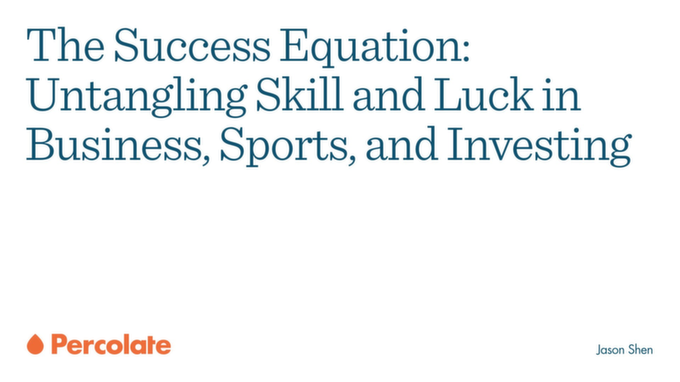These reading notes began life as an “Ignite-style” 5 minute presentation with slides automatically progressing every 15 seconds — which I gave on a Monday morning presentation for Percolate. The words below are essentially what I said during that talk.
The Success Equation, Untangling Skill and Luck in Business, Sports, and Investing.
I think this is a fascinating topic because we all know that both factors are highly relevant for a lot of high performance activities, but they are not easy disconnected. I’ve won a NCAA championship, started and folded a venture-backed company, and invested money in various asset classes so there’s a lot of personal interest here.

My book presentation is on The Success Equation, by Michael Mauboussin, who’s Head of Global Financial Strategies at Credit Suisse. The book is about understanding and managing the role of luck vs skill in complex activities. We’ll start off with a quick quiz.

Between Football, Hockey, Baseball, Basketball and Soccer, in what sport does skill contribute most to winning? Not which sport has the most skillful players, but which sport does skill most affect a team’s win loss record?

Based on analysis which I can walk you through after this presentation the author determined that skill has the most influence on basketball when it comes to a team’s win loss record, and hockey is the most influenced by luck.

In theory, you could model nearly any competitive activity on a skill versus luck continuum. Poker might be at the massively luck driven side of things, while chess might be as close to a “pure skill” game as we can get.

The author recommends taking different approaches depending on what kind of activity you’re involved in. For activities that involve a lot of luck, the key is to study, create, and follow a good process. Like a poker player who focuses on betting when the odds are in his favor.

For areas where both luck and skill matter, checklists can help prevent accidents from happening. Airplane pilots have long used checklists before take off to ensure safety. I understand the product team similarly uses a mix of process and software to manage deployments.

Finally, in activities largely controlled by skill, like public speaking or driving to the hoop, you want to leverage deliberate practice. Work with a coach and get lots of feedback to improve. Design reviews, retrospectives, debriefs are all great ways of doing that.

Another concept he introduces is the idea of a good statistic or metric. A good metric is one that’s persistent, meaning it is stable over time, and that’s predictive, meaning it is closely linked with outcomes that are meaningful.
Batting Average vs On Base Percentage
For instance, in baseball, we often focus on player’s batting averages. This metric is not ideal because it’s not as persistent or as predictive as other metrics like on base percentage, which is how a player actually reaches a base each time he goes at bat.

When you look at the stats, on base average, especially with slugging, is more persistent over time for a given player and it is more predictive of runs scored, which is basically what you need to win a baseball game.

It think another way to think about it is 1) can you control the metric. And 2) is the metric linked to business outcomes? A bad example might be that a gaming company that focuses on earning top scores on review sites, which is hard to control, and not well linked to game sales.

A better example would be Percolate’s happiness index, which is based on [things I can’t reveal here]. These are largely in our control, and we have measured them to be leading indicators of churn.
The final idea I’ll present today is on social influence. In many cultural settings, whether that be music, movies, books, or even technology, social influence and quality are akin to luck and skill. (Photo Credit)

In 2006, Columbia researchers created a website called MusicLab where people could listen to, rate and download 48 songs from unknown bands. In one scenario, users got no additional information about how other people were rating or downloading songs.
Parallel Universes
About 20% of participants went through this “blind” world. The other 80% were split into 8 separate worlds of 10% each. In these tracks, ratings and downloads by other users could be seen. These were in essence, 8 parallel universes.

In a world where quality is the only metric that matters, the song rankings from the blind world should carry over into every other world. Of course, as you can probably guess, this isn’t how it played out.
Winning isn't Guaranteed
First off, a song with a high ranking in the blind scenario was more likely to rank highly in other worlds, there were vast discrepancies. One song, which was middle of the pack at 26th in the blind world, was #1 in one of the social worlds and 40th in another.
Take The Lead
Second, the top songs in social worlds had much greater market shares in terms of total downloads than in the blind scenario. Social influence creates a winner-take-all market, where success feeds on itself and small leads magnify over time.

The authors of the Columbia study end the paper by noting that advertising, press, word of mouth and critical acclaim were not a part of the study, and thus if anything, this experiment underestimates the power of social influence.

So to bring this all back, luck and skill both affect our ability to achieve goals. And as a marketing technology company operating in an increasingly interconnected world, brand and social influence matter more than ever, both to ourselves, and our clients.
